A Decade in Game Localization
We meet again! Long time, no post, eh?
I know this blog has been pretty quiet since I initially launched it late last year. It really was my plan to post a little more frequently to it, but between work happenings and just... y'know, The State of Things, I hope I can be forgiven for my diminished after-hours output. For those of you who don't already follow me on Bluesky (none of you?), I'll hopefully do a write-up on Venus Vacation Prism, the recent dating sim spinoff of Dead or Alive Xtreme, as well as the upcoming Tokimeki Memorial Switch re-release once that's out. All of which is to say, the heart still yearns to write about dating sims! The brain just needs to find the bandwidth and time off from hunting for work assignments to do so, but hopefully that'll be sooner rather than later.
At any rate, as you can probably tell from the title, for once, I'm not here to write about galge. As it just so happens, April 16th was my ten-year anniversary of my career in game localization, at least if we're counting when I started working on actual game content. Technically I'd been doing a little bit of work for my first agency before then (translating Japanese chat logs for a western mobile game, of all things... and some eyebrow-raisingly spicy ones at times, at that). But for all intents and purposes, April 16, 2015 was the day I first started putting pen to digital paper and writing down words that you could eventually pay money to read in cartridge and/or disc form. Absolutely wild!
There's a lot of ways I could approach a blog like this. Rather than bore you all with the sort of platitudes you're already likely to find in the localizer parts of LinkedIn, instead, I'd like to take a look back on the games I'm at least cleared to publicly discuss and reflect on both the localization process from my perspective as a freelancer, as well as what they each meant to me, both personally and professionally. I'll generally keep it pretty short and sweet for most of them since even with that truncated resume, it's still a fairly sizeable list. But hopefully for those of you who have been following my work along the way, this post will give you all some more insight into my approach and general creative philosophy as both a translator and writer more generally. Some of the stories here I'm writing about here I don't believe I've shared online before, or at least have only touched upon them very rarely.
And with that, let's get to reflecting!
The Games
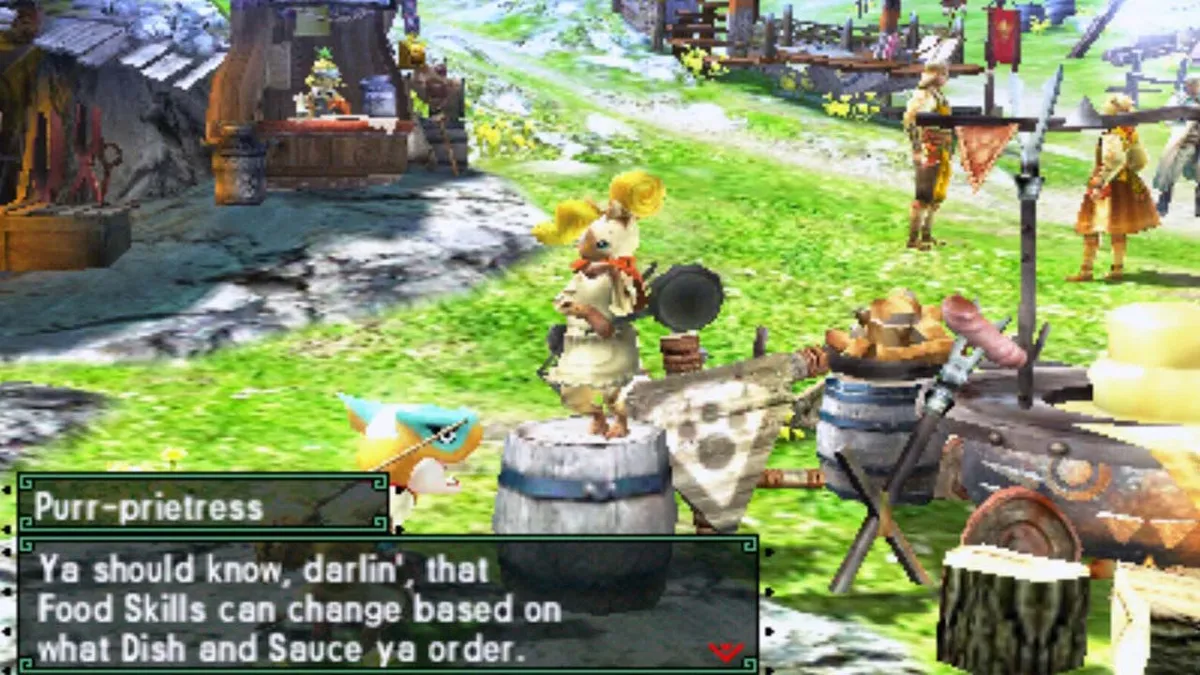
My second ever game localization project as a professional translator and my first credited project. While the first project I did prior to this one—a licensed RPG of some renown, albeit one I only handled sidequest content for—required plenty of learning on the job, this is a game I'll always remember as being something of a trial by fire, if mostly because of how fresh-faced I still was when I got asked to join that team (literally just a month after I'd started doing this whole thing, if you can believe it). For as hard as this game pushed me to do my best to meet what were already lofty standards for the series' localization thanks to 8-4's history with these games, in terms of the actual logistics and project management, even a decade on, this still remains one of the best-run localization projects I've ever participated in on both the agency and the client side alike. Capcom was extremely generous in providing a wealth of supplemental documentation and style guides for that game's enormous, franchise-spanning ensemble cast in addition to providing timely, constructive feedback that not only helped me tune my work to their expectations, but slowly reassured me that maybe 25 year-old me could belong on such a big project after all. For the handful of characters that were completely new to this game like the Purr-prietress pictured above, Capcom was kind enough to let us have first dibs in defining their English voices. To see a lot of my work on that end remain in the final game after their own editing passes was a deeply humbling, yet reassuring thing to discover in the final localized release.
I was still very much so finding my professional feet and self-esteem as a localizer after spending a couple years struggling to find any steady work with my Japanese degree after graduation. But if nothing else, surviving this project and receiving some positive feedback from higher ups much more experienced than me gave me a much-needed early boost in confidence, helping me to prove to myself that not only did I potentially have what it took to work in AAA, people sometimes even enjoyed and appreciated what I wrote for such games. Whether I'll ever work on another Monster Hunter game at this point, I have no idea, but I'll be forever grateful to everyone on the project management side for taking a chance on an unproven guy in his mid-20s still living in the basement of his childhood home without a single credit to his name. I still don't know what possessed you all to pick me over much more experienced translators you surely had on your rosters. But that opportunity and the subsequent credit kindly afforded to me has opened a lot of amazing doors in my career over the years, some much sooner than I think would otherwise be reasonably expected.
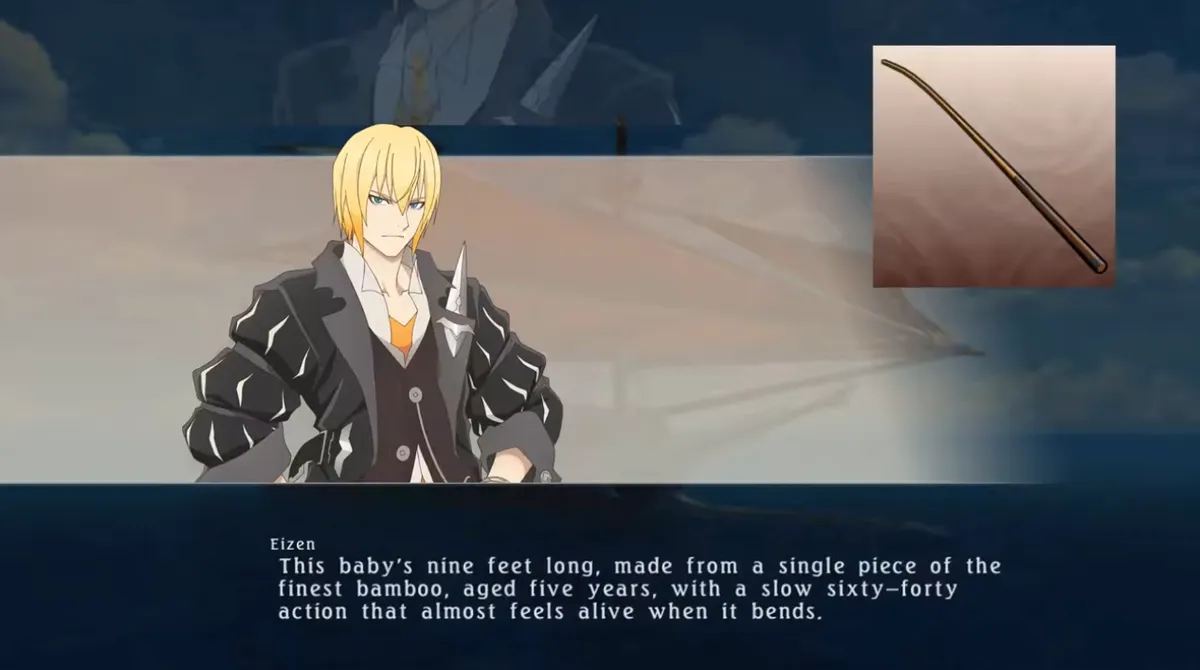
Would you believe it if I told you that the next project offer I got after Monster Hunter Generations was for this, of all games? It's true! Between those two games and then the next game I worked on (a very sizable licensed SRPG that'll sadly forever remain under NDA), my first year on the job was a wild one for my portfolio in ways that few other years have truly matched since (in many ways, mercifully so). In any case, Berseria was my first dalliance with the Tales franchise as a localizer and something of a personal dream come true as someone who grew up playing a ton of Symphonia on the GameCube. I even went so far as to write about its themes at length in one of my first pieces of games criticism as a teenager on Nintendo's old official message board, though labeling it as such would be generous to put it very, very lightly.
At any rate, unlike this game's sequel, the actual duration of my involvement with this game was relatively compact, if still as action-packed as Monster Hunter Generations was between translating the middle third of this game, as well as a healthy chunk of the sidequests and the skits. If memory serves, by the time we were brought on board, all of the game's text was more or less finalized, effectively allowing a small number of us to work through all of the content at a steady clip and have everything delivered back to Bandai Namco in a matter of months, rather than the more protracted manner that can happen with localizing RPGs while they're still earlier in development. There are things I'd do differently were I asked to work on this game from scratch now, but all told, it was a fun and professionally enriching knocking out this game's English script alongside a team of people who were similarly passionate about the material. This was the first project where I had a lot of say on the English terminology and jargon and I believe pretty much all of my suggestions made it into the final game. The heavy emphasis on religious politicking in the setting also enabled me to uniquely draw upon my Catholic school upbringing when hashing out a lot of those terms, which I don't get to do very often (nor particular try to; you try going to Catholic school for nine years straight and tell me how much you want to think about it once you've graduated). I also made friends through this project who I'm still in touch with to this day, some of whom now thrive in pretty prominent positions elsewhere in the industry.
One of these days I'll finally find it in me to actually go back and play this game, even if I'm going to have to try even harder than usual to turn off the part of my brain that wants to keep editing my own work longer after it's been published. I loved writing Velvet in all of her sardonic glory as the protagonist and I'm long overdue a catch-up session with her.
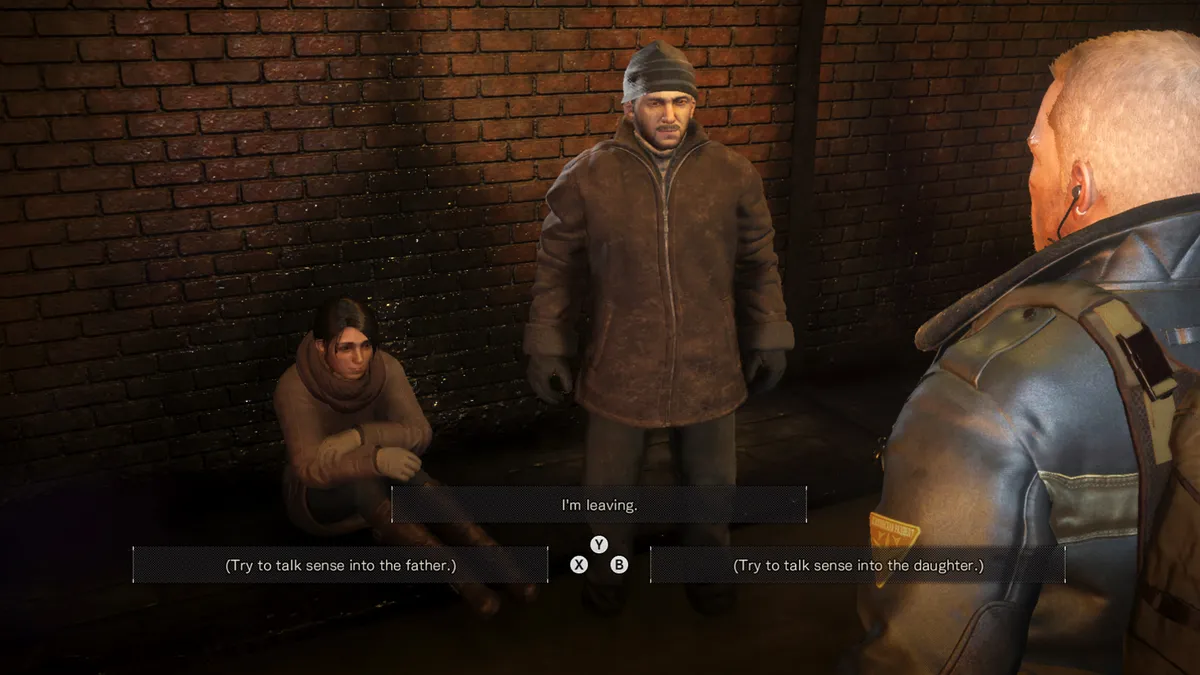
Putting aside the game's overall critical reception and speaking of Left Alive purely in professional terms as a work project, this honestly was in many ways another fun game to work on, a project filled with a lot of pivotal first-time experiences. Somewhat uniquely for this game, Square Enix wanted to embed one of us in their offices to work directly with the development team, even being willing to go so far as sponsor work visas if necessary. It's a remarkably rare opportunity to be extended to freelancers, but it was a testament to just how committed they were to producing a quality localization for this game, even if it was by no means among their most prominent, heavily marketed titles that generation.
The other translator who worked on the English localization with me ultimately ended up doing the embedding at Square Enix while I largely proofread and edited her work as I contributed more miscellaneous translations, mostly things like gameplay tutorials and UI text. It was the first time I'd been put in such a supervisory position on a project, a hat that I've worn many more times since then, especially in recent years, and I couldn't have had a better translator turning in those initial drafts. This was also the first project I ever did LQA (linguistic quality assurance; essentially, the part of the process where the localized text is checked in-game for contextual accuracy, typos/formatting issues, etc.). It's a side of localization that I don't take part in very often but actually always enjoy doing as a nice change of pace from the usual grind. Much like Capcom, my liaisons at Square Enix were very cordial to work with and took my input as a freelancer seriously, even going so far as to make programming changes late in the game's development to ensure we didn't have to compromise on the localization's quality when technical issues arose during that LQA process.
There are (fun!) stories I may eventually get around to telling about this game if the opportunity ever presents itself. But regardless of what the rest of the world may think of the overall game itself, this is another project I have a lot of fond memories of and through which I also made friends that I still talk to regularly.
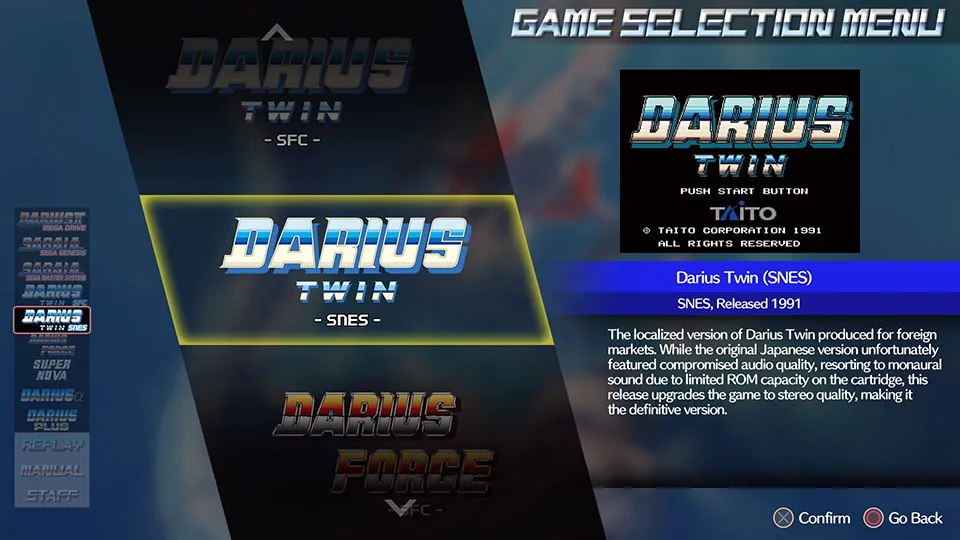
There's not a whole ton to write about this game specifically; we're talking about a collection of arcade sidescrolling shooters whose UI and other content outside of the core games only took two whole work days to translate! A good amount of the text load for this collection came in the form of the historical descriptions for each of the games, which you can read from the main menu before booting into them. Seeing as I had extremely generous text limits to work with for those portions, for a lot of them, I ended up doing additional historical research to flesh that writing out further. Some of the details M2 write about refer to pretty obscure pieces of trivia that, as far as I'm aware, weren't well-documented even in Japanese, let alone English, so I wanted to take special care to make sure I represented those facts correctly for foreign audiences. Sometimes I could only find one or two primary sources for what was being discussed after a lot of digging, but find them I did, and I like to think the final localization was made better for it. It also gave me a much greater appreciation for the history and overall significance of Darius as a franchise, even if I'll probably never be good at any of them to get very far.
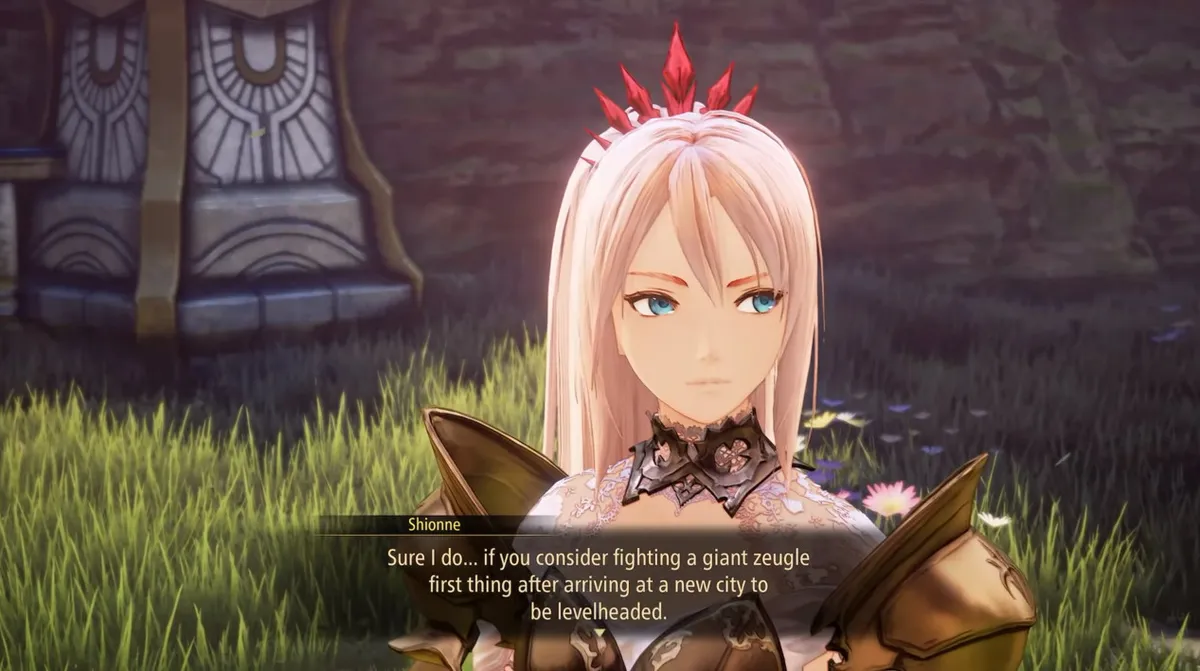
At the risk of sounding cliched, where do I even begin with this one? It's never a given when you work in freelance localization that translation agencies, teams, or even just individuals will be retained between entries in an ongoing series for various business and scheduling reasons. Nevertheless, when I did get the surprise request to come back to the Tales series to work on Arise, it felt like a sign that I was being given an opportunity to make good on the things I'd came to wish I'd done differently on Berseria with the benefit of hindsight, as proud as I otherwise was overall of our work on it (and still remain, to be absolutely clear).
I can and have written entire blog posts and social media thread about my time on this game and my relationship to it and I'm sure this post won't be the last time I write about my work on it. I couldn't hope to contain all of my thoughts and feelings about Tales of Arise and why it's such a special game to me. But if you don't mind me being self-indulgent, I'd like to at least take a little time to explain what made it a uniquely remarkable project out of the dozens I've participated on in my ten years working in games.
Tales of Arise was a localization that took three years to complete. I wasn't always exclusively working on it throughout that time span, but it's a long time to be singularly involved with any single-player, non-live service game as a freelance localizer, even a lengthy RPG. As I've said before, Tales of Arise was a team effort; while I directly handled about 70% of the game's entire script myself, touching every single facet of it you can imagine, I also had the support of a couple of other extremely capable translators and one highly experienced editor and proofreader, a Nintendo of Europe alumnus who put in a lot of time and effort on his part unifying all of our writing styles and making the final localization congeal into a singular whole.
Still, I won't beat around the bush: for large stretches of Arise's localization, I was often the only English translator working on it. To my knowledge, I was the very first translator to be brought on and I know for a fact that I was the very last to leave, at least when it came to the base game. (As I've stated before, I didn't work on the DLC expansion.) Before long, I took point as the de facto lead translator on the freelancer side, managing various logistical aspects for each batch of text in addition to my main writing duties. For a script that's over 700,000 Japanese characters in length, it's exceedingly rare for a single translator to be put in charge of so much of an RPG for such an extended period of time. But it was an opportunity I cherished every step of the way and it remains once of the great honors in my career that even after the additional editing passes our work went through on Bandai Namco's side in preparing for the English dubbing process that the writing you see in the final game remains by and large what we delivered.
So, so many hours and late nights were spent on this game, not only in translating it, but also discussing our evolving work as a team, debating different potential approaches to even the most minor lines in scenes because that's how much the game won us over. There was even one night where I spent eight hours going back and forth with my editor/proofreader about a single line in the game's ending, dissecting the Japanese semantics to make sure our representation of its nuances was pitch perfect. It wasn't a project without its share of bumps in the road, especially when COVID-19 reared its head in the back half of that process. But Tales of Arise will forever be a game that I deeply love and miss just as much. Every game translator, I feel, gets to call at least one of their localizations their child once they get to work in the industry long enough and if I only ever end up having one, Tales of Arise will always be it.
It was a relief when I was finally done with you after all those years, Shionne and Alphen. But I still hope I get the chance to write both of you again one of these years.
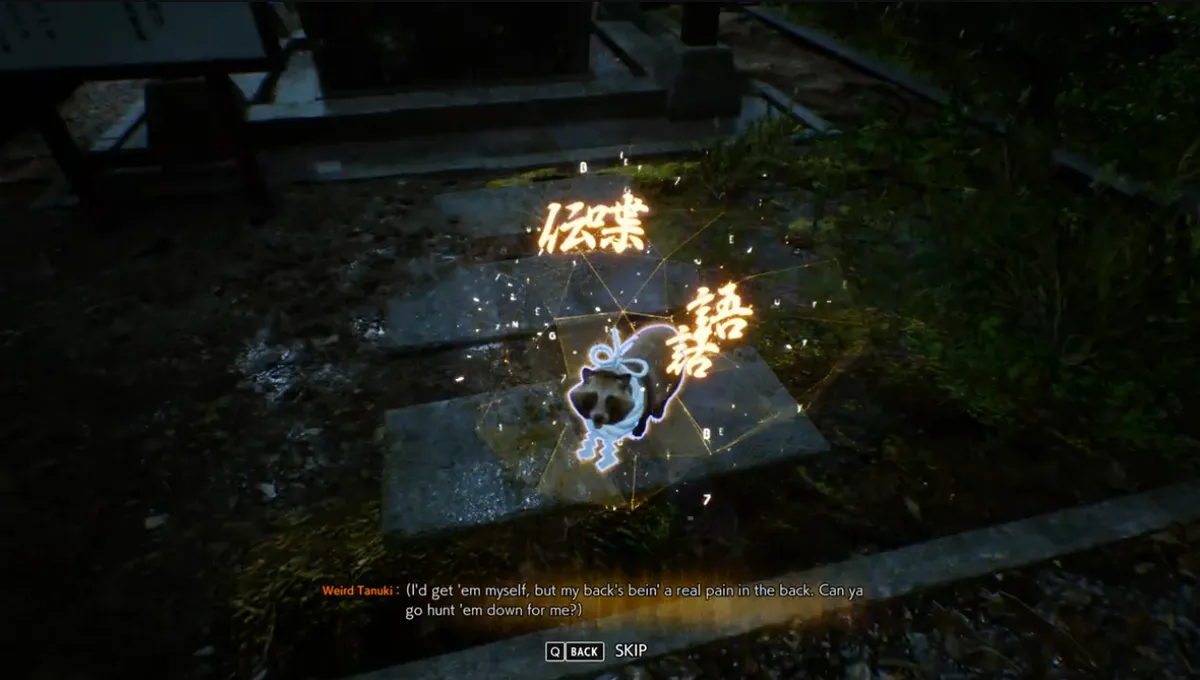
Of all the games I can discuss in this post, few rides ended up being more wild to go on this past decade than this one. This was a project that I "won" through a translation test, a not uncommon process where a publisher will send a small sample script to translation agencies they're negotiating with in order to gauge what sort of localization they can expect to receive from that company should the two sides seal the deal. Sometimes the contents of that test come from the game itself, while other times, it's other works within their library; there's no one right way to conduct such vetting processes and they can vary depending on what a client developer/publisher is looking for in a localization. When I was initially requested to take the translation test, based on the content on it, I had a hunch that it was potentially for Ghostwire. So to not only ultimately pass that test and be asked to work on, for a time, such a high-profile Bethesda game with a lot of hype building up for it, but to do so among what was inevitably stiff competition certainly put a vindicating feather or two in my cap to say the least. Throw in the Microsoft buyout of Tango Gameworks that happened while that localization was ongoing and you have a recipe for a process that was eventful from start to finish.
If you paid attention to the game's promotion and who was attached to it, you probably don't need me to tell you that a lot happened during Ghostwire's development. I'm not privy to all of it, nor am I at liberty to go into specifics about what I know, at least not for a long time, if ever, in all likelihood. Suffice it to say that this resulted in a localization that was similarly protracted like Tales of Arise, if not quite to that same extreme. Throughout most of that process, it was just me and a lone proofreader/editor working on the game on our end. All told, I ended up doing the initial translation work for about 90 percent of the game. In terms of sheer quantity, I believe my work on Arise beats it out, but proportionally, it's a huge amount of the game with which to be singularly entrusted. I'll always be grateful to Bethesda and Tango leadership for placing such faith and trust in me and my editor to do right by their game largely on our own.
While I always strive to deliver highly polished material even if I have to operate completely by myself on a project, because Bethesda wanted an English script that had an appropriately sharp, colloquial, AAA-sounding sheen to it, the collaboration process between me and the editors, both my fellow freelancer and those on the client end, means that the final product is even more an amalgamation of everyone's contributions than the typical localization. I'm still absolutely proud of the work that we put into this game and how it turned out, of course; but it does mean that on a personal level, I don't think of Ghostwire quite as intimately as my child to the degree that I do Tales of Arise, which I'm perfectly happy with. Ghostwire absolutely wouldn't be what it is without everyone else's contributions and, given that mandate, was very much a game that took a village to raise.
The things I look back on most fondly with respect to this game tend to be a little more scattershot than other projects. There's a handful of NPCs and questlines that were a particular joy to translate, my favorite being the tanuki-finding sidequest showcased in the earlier screenshot. The quest giver in Japanese speaks in a dialect that's not heard all that often in Japanese games, which gives that critter's lines a texture that was fun to realize in English. I ultimately arrived at "my best Danny DeVito impression," leaning hard into East Coast American English—at least, insofar as a Colorado boy can muster—and the end result still cracks me up in places, especially his recurring bone that he has to pick with raccoons and the people who ignorantly compare his kind to them. (Don't call him a raccoon dog if you don't want to get on his nasty side!)
The in-game glossary entries that players can also consult to read up the game's various cultural references were also a unique joy to translate. Like Darius Cozmic Collection, the localized English text that I wrote for those is significantly expanded over the Japanese material in an attempt to make things as approachable to western players as possible, even and especially those with only a passing familiarity with Japanese history and culture. Even as someone who translates Japanese for a living, it's rare that I get to take advantage of the rest of my major and university studies to such a thorough degree and from what I've been told, that effort didn't go unnoticed by players, which is genuinely gratifying.
To say it was a lot to juggle both this and Tales of Arise in tandem, routinely bouncing back and forth in-between individual text batches, would be an understatement. While I'm glad my schedule has largely calmed down since that period in terms of maintaining commitments to multiple hefty games for years at a time, it was certainly one of the most continuously productive stretches I've had in this career. Working on both games has definitely made me a better translator now that both of them are thankfully well, well in the rear-view mirror.
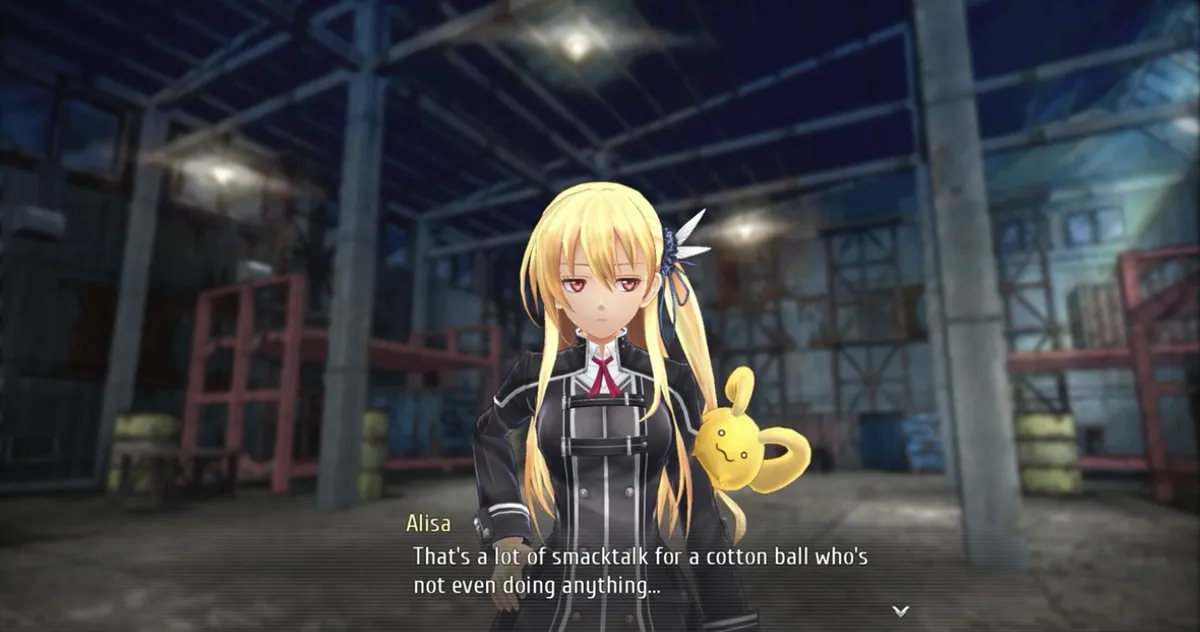
This was the first of two Trails games I ended up being privileged to work on back-to-back, beginning a period of over two years where I spent the bulk of my freelancing time working on Falcom's seminal, long-running RPG series as NISA began to try and slowly close the gap between Japanese and English releases. Prior to this point, Trails was a series that I played predominantly in English. Soon after receiving my very first paycheck as a games translator, one of the very first games I bought was actually an imported Japanese copy of Cold Steel I, which I bounced off of after about 15 hours due to a mixture of an exceptionally slow introductory sequence, even by series standards, as well as the dialogue just being rife with dense political and economic jargon that I didn't feel like dealing with in my downtime. Eventually, I came back around to the Cold Steel games in English by way of the excellent PC ports and after blitzing through the initial two entries that way, remained current with the subsequent PS4 English releases as NISA put them out. It's no exaggeration to say that prior to my recruitment, Trails was very much a localization effort I preferred to admire from afar, relieved that the dense scripts and intricate lore decades in the making was somebody else's problem.
Fast forward to six years after that initial aborted attempt to play Cold Steel I in Japanese, when that problem suddenly became mine at last and I felt that it was time to go back and confront that skeleton in the closet. Since Reverie was already out in Japan by the time we began working on it and I was otherwise up to speed with the English games, having played Cold Steel IV when it launched the year prior, I took it upon myself to sit down and play this game in Japanese, ideally as quickly as I could reasonably manage. While not strictly necessary on a team filled to the brim with series experts, since I otherwise had the financial flexibility and support from NISA to do so, I knew it was in my professional best interests to only begin working on the game once I had played it from start to finish, taking as much side content as I could uncover along the way. That's how I spent three work weeks, Monday to Friday, in April 2021 doing almost nothing but playing this game in Japanese for six hours a day, only beating it after an eye-watering 90 hours of playtime. Again, I want to stress that I volunteered for this and nobody was pressuring me to do this whatsoever. But in any case, I can't say I recommend that anybody else play a Trails game for work that way if you don't have to!
Regardless, I do feel that my work on this game was made tangibly better by putting in that legwork beforehand. (In a better world, such things would be standard practice in game localization projects, but, save for a very select few cases, getting client companies to send you builds of games to play for reference is like pulling teeth out of them no matter how many NDAs you sign. This despite the fact that localizers are almost never the actual vector for major leaks for obvious reasons.) Unlike its sequel, most of my contributions focused predominantly on the game's expansive side content and loquacious NPCs, of which there's plenty of both. As Reverie is intended to close out what remains the Trails series' lengthiest story arc to date, there's a lot of loose ends to tie up, which meant plenty of opportunities to stretch my dialogue muscles and write in dozens—that's not an exaggeration—of different characters' voices. If that sounds like a lot to keep straight, trust me, it is, especially as that saga's final chapter. Nevertheless, it was a challenge I certainly relished as someone who most enjoys writing dialogue even to this day. Major highlights of my work include the Magical Alisa shooter minigame (pictured above) with all of its goofy, homage-laden one-liners, as well as the dating sim-adjacent VR content, which was specifically assigned to me for reasons that I'm sure none of you can guess. Project and editing lead Leona Renee and I also shed much blood, sweat, and tears writing character barks for all 50 recruitable party members within the main dungeon, an experience I hope I don't have to relive anytime soon. Every type of scenario for a character to speak up that Falcom envisioned had those lines written in 50 different ways. Ways that tended to be much more straightforward for the developers to churn out in their native language (a minor change in verbal conjugation here, a different sentence-ending tic there), but require much more manual labor to properly differentiate everyone in English. I've never experienced anything like it on an RPG localization before or since then and I hope I don't have to again for a very, very long time...
All in all, it was a very fun project with a supportive publisher by way of NISA that made me come away feeling a lot more comfortable and confident playing Trails games in Japanese at last. Having dropped off the series professionally after its sequel (which I'll get to later), I'll probably go back to catching up on the series in English in due time. However, in the event that I do end up going back to the series one of these years, I'll gladly do so knowing it's not as daunting in Japanese as it might appear at first glance, which is perhaps the greatest victory of all to be derived from my involvement with this game.
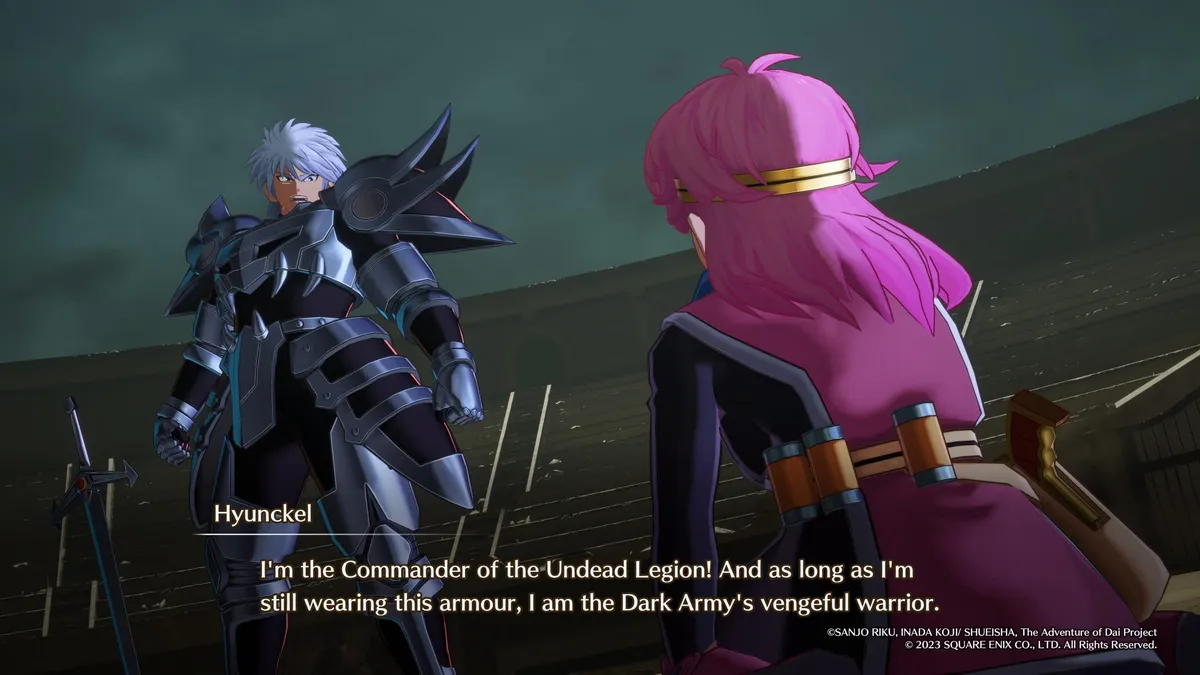
After a long hiatus since my previous collaboration with Square Enix on Left Alive, I got called upon to return to the proofreader and editor's chair for this game adaptation of Dragon Quest's iconic shonen action series spinoff, which dates back to the early 1990s. People who kept an eye on this game's development cycle know that it was a protracted one and, trust me, we on the localization side felt it just as much, even though I don't have any more insight into what all that transpired than the public does (read: just about none, as far as I'm aware). Be that as it may, like Left Alive, on a professional level, this project was also one of the more logistically unique ones in a variety of fun, interesting ways and our handlers at Square Enix were once again excellent partners who valued our input when we offered it.
The thing that'll likely always stand out the most in my memory about this project is the dialogue translation process itself. While there were some lines that were new and unique to the game, much of it is sourced directly from the anime remake. This meant that, in turn, rather than translate a lot of those lines from scratch and subsequently rerecord an entire storyline, we were handed copies of the official dub script for about the first 50 episodes and asked to reuse its dialogue where possible, double-checking it against the game's Japanese text to make sure that those translations were still applicable.
In many cases, they did and could be reused just fine. However, sometimes, because of edits that were made to scenes for brevity or just overall flow, lines that were in the anime sometimes got cut, which would have ripple effects on the translations of existing lines that remained further down the line. As the scripts were written with ADR in mind and tweaked based on what was happening on screen in the anime, there were cases where English lines that worked in-context within the show didn't in the game, necessitating our own edits or even outright retranslations at times. Luckily, Square Enix had the means to rerecord any lines as needed with the existing English cast so long as we flagged such dialogue beforehand, so it was all perfectly manageable. In my experience, such workflows don't always get used on licensed products, probably because of rights ownership when it comes translations of source material in different mediums, so it was intriguing to be tasked with adapting so much preexisting work for once, rather than redoing it from scratch.
As a Dragon Quest localization, this game was also unique when it comes to its dialect. Contrary to the mainline games for the better part of two decades now, which tend to be helmed by celebrated UK localization outlet Shloc, outside of established series keywords, Infinity Strash was consciously written in US English since that's what the remake anime itself was dubbed in. Quite frankly, as someone who has struggled in the past to write in UK English specifically when projects have occasionally mandated it, this was a significant factor in my agreeing to work on the project to begin with, as I could rest easy knowing that my native dialect wasn't going to be, as I believe they say, throwing a spanner in the works. It's an opportunity that doesn't arise often with the franchise these days, one that I savored quite a bit because it meant we could put our own stamp on the series and how it projects itself linguistically. How many people wound up seeing our handiwork in the end is, perhaps, another subject. But like Left Alive, on its own merits, Infinity Strash was another enjoyable Square Enix project with some talented people involved at every step and I look forward to hopefully having the chance to work on another one of their games sometime in the future, be it big or small.
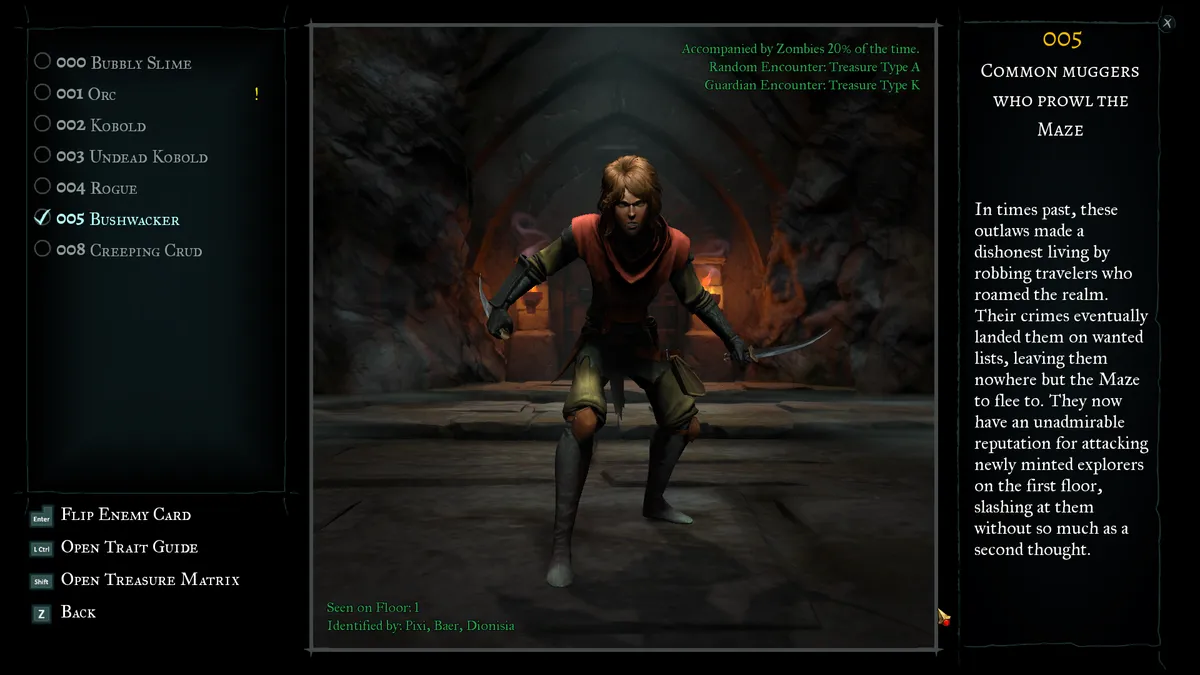
Even though the Wizardry series has a rich heritage in Japan, considering the remake's development at Digital Eclipse, a US studio, you would be forgiven for thinking there wouldn't be much use for a Japanese translator like myself. As it turned out, though, there was one particular portion that needed outside help: the enemy glossary descriptions, which were written by famed Wizardry guide writer and Japanese lore architect Benny Matsuyama.
I've been friendly with 8-4's staff members over the years due in part to our shared experience working on Monster Hunter and especially Tales and this game ended up being our very belated first collaboration together. With no need to worry about text space limits and a permission to layer in my own stylistic flourishes for ambiance where appropriate, this made for a brief, but very fun collaboration with a highly experienced crew of editors on the 8-4 end who took my material and helped polish it to be its best self. (I especially can't thank Ryu Ito, their in-house English-Japanese translator and bona fide Wizardry expert who handled the remake's localization, enough for fact-checking my work to make sure my English text didn't conflict with the underlying lore and mechanics!) The foundation of much of what's in the final game is still my work, but I can't overstate how instrumental it was to have those additional eyeballs on my material to tighten things up that much further. While I'm very used to flying solo in this line of work and do my best to deliver an end product that's self-edited and intended to compete with more fully staffed localizations, a good editor or two on a project is always to be treasured, especially on a project for an IP of such historical importance.
Beyond that, as someone who didn't grow up reading a lot of high fantasy and doesn't write in that style very often professionally, it was refreshing getting to work on this redux for a game that's so foundational to RPGs and fantasy games in general. While it's true that this post is already full of games and franchises I never would've imagined I'd be lucky enough to work on when I first started working in this field, Wizardry as a series with such an important place in early game history ranks especially high on that list. I still have yet to reach the innermost sanctum of the labyrinth in this remake, but it was a genuine honor both professionally and personally to delve into it and leave my mark on it, brief as my time was within those depths.
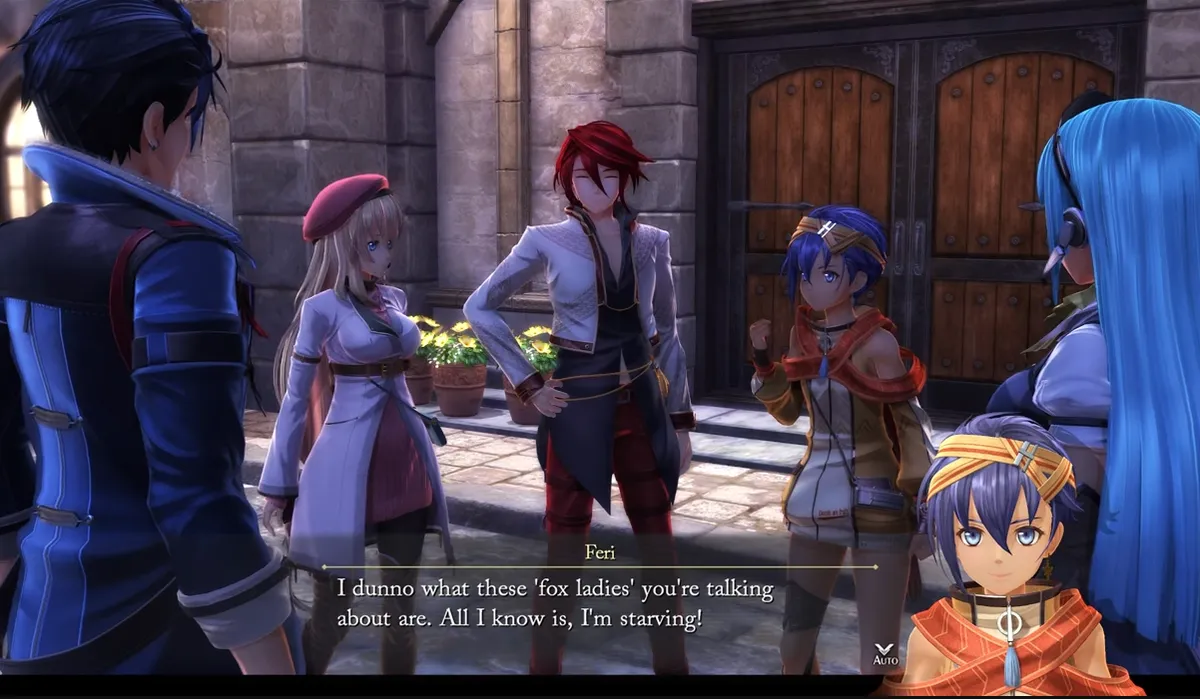
We come to our final stop on this list with one more gargantuan Falcom RPG, if slightly less so than the last game by volume, believe it or not. While some other games I worked on got released in-between Trails into Reverie and this game, as I said elsewhere, scheduling-wise, in practice, I pretty much dove straight into this game as soon as my work on the former wrapped up. It coincided with an incredibly turbulent time in my life, during which, among other things, I moved twice within the span of seven months, the second of which was out of the country into Japan, where I reside to this day. Taking on another Trails game in the midst of all that was admittedly a lot to ask of myself, as I did all of the packing and shipping of my possessions over to Japan during that period, as well. And let's not even mention the protracted period of time I spent searching for a place to live and settling in once I did get to Japan. At the same time, however, because my work is one of my passions, for better and for worse, big projects tend to ground me and give me central focal point while other parts of my life are in stressful flux and that was as true as it's ever been with this game.
Even if the early days and months of my work on Reverie put me through the ringer in some ways, with that experience working on a hefty Falcom title under my belt, I was able to hit the ground running on this game and I feel that work on this entry as a Trails game benefited from that familiarity. While I still worked on plenty of side content and NPC dialogue, this time around, I was put in charge of the large majority of the main story's third chapter. Were this still a Cold Steel game, I would've been a little more trepidatious at that prospect. But since Daybreak represents a fresh new beginning for the series as the introduction to its current plot arc, it felt a lot safer for me to jump into the thick of things plot-wise this time, even if there remain plenty of callbacks to previous game and various bits of background lore.
Daybreak has a fun and unique main party within the series. Many of its members skew somewhat older than those found in the previous games, which goes a long way to lending its writing a more worldly, nuanced feel than even previous games. Society in Calvard is complex and rich with multiracial history, a fact that some actors pulling the strings behind the scenes appreciate more than others. At their best, Trails games have always had solid texture and senses of place and history in their storytelling, but Daybreak's setup reveals a particular cognizance of the real world that isn't always seen in other Falcom works. While there was a lot of trust and faith put in me by the project leadership when it came to day-to-day creative decisions that I made, regular, extensive discussions took place on a wide array of topics across the entire team. Everybody remained in touch and aware of what everyone else was doing on the project and how their portions contributed to the greater whole, which, biased as I may be, I feel produced one of the series' most polished localization scripts, if not outright. (Mind you, I have yet to play its sequel, which I have every reason to believe was also handled well, as a portion of this game's team went on to work in-house at NISA for that game.)
Had I been able to continue working on this series, I would've loved to and my inbox is always open to Falcom and NISA should they want me to return to the trenches for another one of their mammoth RPGs. But if not, this game, which I ended up spending a little over an entire calendar year working on from start to finish, was a fine way to cap off another deeply memorable period of collaboration with some of my genuinely favorite people in this entire industry. Working on any one Trails game for any length of time is already bound to bring a team close together. Working on multiple games one after another makes you war buddies with lots of fond stories to reminisce over for the rest of your days.
Oh, and as for a certain "FnV" line spoken in the Tharbad chapter with that conspicuous bleep? That was my doing. My most enduring legacy in Trails may well be a humble f bomb and I'm proud of that.
Special Thanks
I know this blog is already running quite long and I promise there's an end in sight! But if you can allow me one last indulgence before I wrap things up in earnest, I'd like to take a brief moment to thank a handful of individuals who have made a particular difference in my career in one way or another. Ten-year work anniversaries don't come around every day and while I still talk to some of these individuals on a regular basis, I'd be remiss if I didn't take the time to express my gratitude for their immense support over the years in various ways. And so, without further ado:
Thank you to Brandon Cushenberry for giving me a chance so early in my career in inviting me to work on both Monster Hunter Generations and Tales of Berseria, as well as returning to me again for Tales of Arise years later. You were every bit what an ideal project manager in game localization should be during our time working together: supportive of a translator and fostering their growth while advocating on their behalf when necessary, both with translation agencies and the client companies themselves. And in many ways, you saved my life in helping me arrange for my work visa that finally brought me back to Japan many years later than I had originally planned. I don't know if you'll ever read this, but much of my success over the years is due in no small part to you encouraging me to believe in myself and my work and being the exact kind of senpai I needed in those early days. I'll never forget everything you did for me and will remain eternally grateful. Wherever you are these days, I hope you're doing well and surrounded by people and coworkers who appreciate your myriad talents and thoughtful nature.
Thank you to Jamie Grant, my comrade in arms as my proofreader and editor on Tales of Arise from start to finish. I never thought we would end up working on that game for nearly as long as we did, and in a less tumultuous world and industry, we probably wouldn't have. But I'm glad we were able to because, together with the other translators, it allowed us to sit down, ruminate, and hash out our localization to an extent people in our position are rarely afforded. Your support and advocacy for all of us translators towards the very end of that project will never be forgotten. How you conducted yourself as the most senior contributor on that project during that time was truly inspiring and I'm trying my damnedest to emulate your example as I take on leadership roles on projects more and more. May we eventually be able to share the fruits of our exploits since then one of these days, because we remain as potent of a combination as ever, if I do say so myself.
Thank you to Leona Renee, a veteran in Trails and Japanese game localization in general who I'm proud to call one of my closest, dearest friends I've made in this business. You have been my rock during some of my most personally fraught periods in recent years and your generosity with your time and support on all levels, personally, professionally, and emotionally, has meant the world. I can only hope that I'm able to return even a fraction of the favor in the future. You're one of the absolute best editors I've ever worked with and an equally excellent project manager to boot; the improvements to our work circumstances that you brought to bear for Daybreak were immense and set a bar to which I continue to hold other clients to this very day. And on a personal level, as someone who followed your work and online presence long before we had a chance to meet, I'm so tremendously proud of how far you've come since entering the game industry and where you're going in your future. We're not done working together by a long shot and everybody better get ready for us to whip up another world-class localization next time we do!
Thank you to Stephen Meyerink, another editor I spent years working with hand-in-hand on Ghostwire. Your own tremendous editing talents were also crucial to us winning that project against immense competition. Our time working together may have ultimately been fleeting before you took your skills to more stable pastures, but there is no Ghostwire without you and your work, too. You've also been a great friend and confidant whose solidarity in navigating our industry's treacherous work politics has gone a long way to keeping me sane. You have so much to be proud of and plenty more to share with the world and I can't wait to see what else you've got up your eloquent sleeves.
Thank you to Kristin Osani and Jeff Wilson. Most of our professional collaborations over the years sadly remain under wraps, but our industry and the writing world in general is tremendously lucky to have you both. More so than anybody else in this country, you two have been there for me most as I relearn life in Japan and how to make the most of it as a foreigner. Your kindness in answering even the most basic questions I'm embarrassed to ask even this many years in is always appreciated and then some. Thank you both, as well, for coming over to my apartment and helping take care of things on such short notice when I was briefly hospitalized soon after my move, too. Navigating this country even when you speak the language can be a lot on your own even in the best of times, but your companionship and support do much to ensure I've never felt alone and left to fend for myself for even a second since coming back.
Thank you to Shinji Mikami. We've never talked directly and wouldn't have had much need to during my time on Ghostwire: Tokyo. But your direct expression of gratitude to those of us in localization for our contributions to the game in your wrap-up email for that project meant more than any of us on our end could ever put into words. I could tell from working with our liaisons that Tango Gameworks was (and I'm sure still remains) one of the most humane developers in the Japanese industry, let alone one owned by a platform holder at the time, and clearly that company owes a debt to you and your leadership for setting the tone for how people there should treat one another, including your external contractors. I hope one day I get to share these words with you in person because so many other people and companies could learn to take a page from your book.
The End
Even after 8000 words and change, I still have much I could say about the games I've worked on in these first ten years, the people I've met along the way, and the gratitude I have for being given all of these incredible experiences year after year. But I hope this is enough to at least hint at how much this job means to me as someone who grew up poor in Colorado, learned Japanese from scratch after coming of age, and largely having nobody but myself to teach the arts of both writing and translation alike. While it'll probably be some time before I have more to share about what I've been up to, I firmly believe that my best work, my best years in this industry are still ahead of me and with your enduring support for me and what I do, I'll hopefully still be doing what I do best for another decade to come.
Whether you've played any of my games or know me for god knows which of my innumerable rabbit holes I somehow unashamedly go down online time after time, thanks for giving me and my work the time of day. It's been the honor of a lifetime to work on the games that I have so far and it's my sincere intention to keep doing right by them and keep doing all of you out there proud the only way I know how.
Here's to another decade of Japanese games and translations. 🥂
